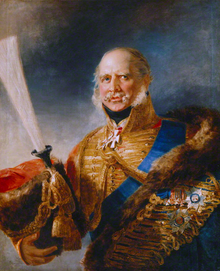Ernest Augustus, King of Hanover
| Ernest Augustus | |
|---|---|

Portrait by George Dawe, 1828
|
|
| King of Hanover | |
| Reign | 20 June 1837 – 18 November 1851 |
| Predecessor | William IV |
| Successor | George V |
| Born |
5 June 1771 Buckingham House, London |
| Died | 18 November 1851 (aged 80) Hanover |
| Burial | Herrenhausen Gardens, Hanover |
| Spouse | Frederica of Mecklenburg-Strelitz |
| Issue | George V of Hanover |
| House | Hanover |
| Father | George III |
| Mother | Charlotte of Mecklenburg-Strelitz |
| Signature |  |
Ernest Augustus (5 June 1771 – 18 November 1851) was King of Hanover from 20 June 1837 until his death. He was the fifth son and eighth child of George III, who eleven years before Ernest's birth had inherited the thrones of two kingdoms, Great Britain and Ireland, and also that of the Electorate of Hanover, still part of the Holy Roman Empire. As a fifth son, Ernest seemed unlikely to become a monarch, but none of his four elder brothers produced a legitimate son who lived past infancy. The Salic Law, which barred succession "to or through a woman," prevailed in Hanover; therefore, when his elder brother William IV died in 1837, Ernest succeeded him as King of Hanover, for Hanover had become a 'Kingdom' when the Holy Roman Empire was abolished in 1806. In the United Kingdom a different law of succession prevailed, and Queen Victoria succeeded to the throne, thus ending the personal union between the British Isles and Hanover that had existed since 1714.
Ernest was born in England but was sent to Hanover in his adolescence for his education and military training. While serving with Hanoverian forces in Wallonia against Revolutionary France, he received a disfiguring facial wound. In 1799, he was created Duke of Cumberland and Teviotdale. Although his marriage in 1815 to the twice-widowed Frederica of Mecklenburg-Strelitz met with the disapproval of his mother, Queen Charlotte, it proved a happy one. By 1817, King George III had only one legitimate grandchild, Princess Charlotte of Wales, and when she died in childbirth, Ernest was the senior son to be both married and not estranged from his wife. This gave him some prospect of succeeding to the British throne. However, both of his unmarried older brothers quickly married, and King George's fourth son, Edward, Duke of Kent, fathered the eventual British heir, Princess Alexandrina Victoria of Kent, later Queen Victoria.
...
Wikipedia
